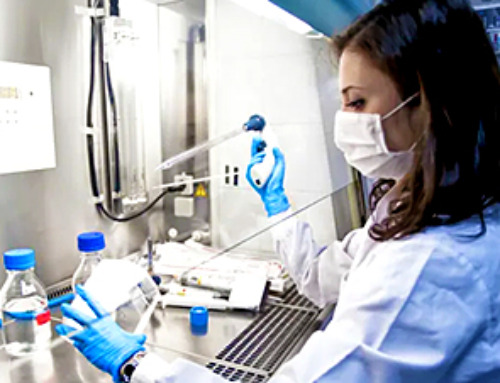A study from Cedars-Sinai's Smidt Heart Institute suggests that immune system dysfunction could be causing long COVID-19. The study found that patients with long COVID-19 produced antibodies against the virus for an extended period after vaccination, with especially high levels of nucleocapsid antibodies. The implications of this sustained immune response are still unclear, and researchers are now seeking a definitive biomarker for diagnosing and understanding long COVID-19.
Findings show people with long COVID-19 respond differently to COVID-19 vaccines.
A new study by investigators from the Smidt Heart Institute at Cedars-Sinai suggests long COVID-19 might be caused by a dysfunction of the immune system.
The study, published in the journal BMC Infectious Diseases, found that after people with long COVID-19 received the COVID-19 vaccine, they produced antibodies against the virus that causes COVID-19 for months longer than expected.
"There's general consensus that some level of aberrant immune response happens in long COVID-19, and this study adds to the evidence to suggest this is true," said Catherine Le, MD, co-director of the Cedars-Sinai COVID-19 Recovery Program and a senior author of the study.
Long COVID-19, a condition in which people experience COVID-19-related symptoms three months or more after initial infection with the virus that causes COVID-19, is estimated to affect 65 million people worldwide. Common symptoms include fatigue, shortness of breath, and cognitive dysfunction such as confusion and forgetfulness. Some symptoms can have debilitating effects.
To study the immune response of people with long COVID-19, investigators analyzed blood samples from 245 people diagnosed with long COVID-19 and 86 people who had COVID-19 and fully recovered. All the study participants had received either one or two doses of a COVID-19 vaccine regimen.
"We examined one part of the immune system response, the production of antibodies, which is mediated by immune cells called B-cells," Le explained.
Specifically, the investigators looked at two types of antibodies that attack the virus that causes COVID-19. One of these is called the spike protein antibody, which attacks a protein on the exterior of the virus. The other is the nucleocapsid antibody, which attacks the part of the virus that allows it to replicate.
The investigators found that people who were diagnosed with long COVID-19 produced higher levels of spike protein and nucleocapsid antibodies than people without long COVID-19. Eight weeks after receiving a dose of the COVID-19 vaccine, antibody levels in people without long COVID-19 began to decrease, as was expected. People with long COVID-19, however, continued to have elevated antibody levels, especially of nucleocapsid antibodies.
"What you would expect after getting a COVID-19 vaccination is a jump in your spike protein antibody levels, but you wouldn't expect a significant increase in nucleocapsid antibody levels," said Susan Cheng, MD, MPH, the Erika J. Glazer Chair in Women's Cardiovascular Health and Population Science, director of the Institute for Research on Healthy Aging in the Department of Cardiology at the Smidt Heart Institute, and a senior author of the study. "You would also expect these levels to eventually decrease and not persist for so long after vaccination."
Although this study shows that long COVID-19 affects the immune system, it's too soon to draw firm conclusions from these findings, according to the study's authors.
"Theoretically, the production of these antibodies could mean that people are more protected from infection," Le said. "We also need to investigate if the elevated immune response corresponds with severity or number of long COVID-19 symptoms."
Investigators are continuing to study blood samples from people with long COVID-19. They are hoping to identify a measurable molecule that could be used to diagnose long COVID-19 and better understand the biological processes that cause it.
News
Lab-grown corticospinal neurons offer new models for ALS and spinal injuries
Researchers have developed a way to grow a highly specialized subset of brain nerve cells that are involved in motor neuron disease and damaged in spinal injuries. Their study, published today in eLife as the final [...]
Urgent warning over deadly ‘brain swelling’ virus amid fears it could spread globally
Airports across Asia have been put on high alert after India confirmed two cases of the deadly Nipah virus in the state of West Bengal over the past month. Thailand, Nepal and Vietnam are among the [...]
This Vaccine Stops Bird Flu Before It Reaches the Lungs
A new nasal spray vaccine could stop bird flu at the door — blocking infection, reducing spread, and helping head off the next pandemic. Since first appearing in the United States in 2014, H5N1 [...]
These two viruses may become the next public health threats, scientists say
Two emerging pathogens with animal origins—influenza D virus and canine coronavirus—have so far been quietly flying under the radar, but researchers warn conditions are ripe for the viruses to spread more widely among humans. [...]
COVID-19 viral fragments shown to target and kill specific immune cells
COVID-19 viral fragments shown to target and kill specific immune cells in UCLA-led study Clues about extreme cases and omicron’s effects come from a cross-disciplinary international research team New research shows that after the [...]
Smaller Than a Grain of Salt: Engineers Create the World’s Tiniest Wireless Brain Implant
A salt-grain-sized neural implant can record and transmit brain activity wirelessly for extended periods. Researchers at Cornell University, working with collaborators, have created an extremely small neural implant that can sit on a grain of [...]
Scientists Develop a New Way To See Inside the Human Body Using 3D Color Imaging
A newly developed imaging method blends ultrasound and photoacoustics to capture both tissue structure and blood-vessel function in 3D. By blending two powerful imaging methods, researchers from Caltech and USC have developed a new way to [...]
Brain waves could help paralyzed patients move again
People with spinal cord injuries often lose the ability to move their arms or legs. In many cases, the nerves in the limbs remain healthy, and the brain continues to function normally. The loss of [...]
Scientists Discover a New “Cleanup Hub” Inside the Human Brain
A newly identified lymphatic drainage pathway along the middle meningeal artery reveals how the human brain clears waste. How does the brain clear away waste? This task is handled by the brain’s lymphatic drainage [...]
New Drug Slashes Dangerous Blood Fats by Nearly 40% in First Human Trial
Scientists have found a way to fine-tune a central fat-control pathway in the liver, reducing harmful blood triglycerides while preserving beneficial cholesterol functions. When we eat, the body turns surplus calories into molecules called [...]
A Simple Brain Scan May Help Restore Movement After Paralysis
A brain cap and smart algorithms may one day help paralyzed patients turn thought into movement—no surgery required. People with spinal cord injuries often experience partial or complete loss of movement in their arms [...]
Plant Discovery Could Transform How Medicines Are Made
Scientists have uncovered an unexpected way plants make powerful chemicals, revealing hidden biological connections that could transform how medicines are discovered and produced. Plants produce protective chemicals called alkaloids as part of their natural [...]
Scientists Develop IV Therapy That Repairs the Brain After Stroke
New nanomaterial passes the blood-brain barrier to reduce damaging inflammation after the most common form of stroke. When someone experiences a stroke, doctors must quickly restore blood flow to the brain to prevent death. [...]
Analyzing Darwin’s specimens without opening 200-year-old jars
Scientists have successfully analyzed Charles Darwin's original specimens from his HMS Beagle voyage (1831 to 1836) to the Galapagos Islands. Remarkably, the specimens have been analyzed without opening their 200-year-old preservation jars. Examining 46 [...]
Scientists discover natural ‘brake’ that could stop harmful inflammation
Researchers at University College London (UCL) have uncovered a key mechanism that helps the body switch off inflammation—a breakthrough that could lead to new treatments for chronic diseases affecting millions worldwide. Inflammation is the [...]
A Forgotten Molecule Could Revive Failing Antifungal Drugs and Save Millions of Lives
Scientists have uncovered a way to make existing antifungal drugs work again against deadly, drug-resistant fungi. Fungal infections claim millions of lives worldwide each year, and current medical treatments are failing to keep pace. [...]





















